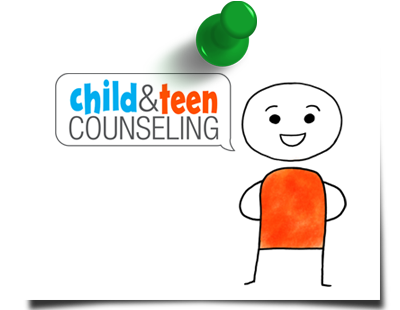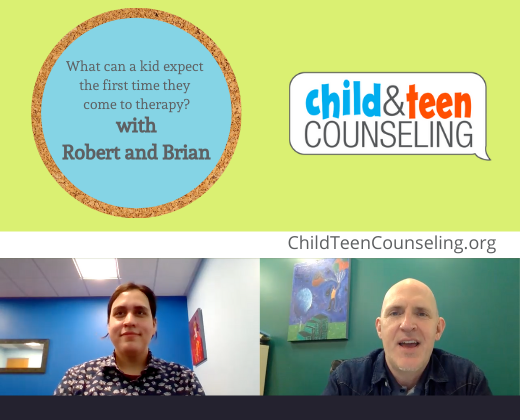00:00:01 Speaker 3
Hey, everyone. My name is Brian Frith Smith, and I am the office manager and social media coordinator
here at Child and Teen Counseling in Wilmon Hills. And I am joined today by hi.
00:00:14 Speaker 2
My name is Robert Jimenez. I'm a therapist trainee supervised by Kent Tucson at Child Teen Counseling.
00:00:19 Speaker 3
So Child and Teen Counseling is a nonprofit therapy organization.
00:00:24 Speaker 4
Our goal goal is to help kids.
00:00:26 Speaker 3
Teens, and families live happier lives. We have affordable rates to help families in need and
to hopefully provide therapy for people of all budgets and make therapy more affordable for
all.
00:00:40 Speaker 4
So we're going to talk a little.
00:00:41 Speaker 3
Bit about Child and Teen Counseling and give you a little taste of who we are. My first question
for Robert here today is robert, if I'm a kid and maybe my parents are dragging me in here for therapy
or maybe they're not, maybe I chose to come in here myself, what can I expect if I've never done
it before? What can I expect for my first session or my first few sessions? What's it going to
be like? What are you going to do? What are you going to ask me?
00:01:09 Speaker 2
Great question. It's a great question because I think a lot of people have kind of this notion
of therapy, that it might be very scary or might be very anxiety inducing because they have no
idea what therapy is. They might have a notion of it from movies or books or shows or what have
you. For the first session, we really focus on Rapport building. So what is rapport building?
Rapport building is basically building that trust and building that relationship, getting
to know each other. I'm not going to have my client, the first one, come in and lie down the couch
and tell me their deepest, darkest fear. If you want to do that, more power to you. But if you're
scared or you feel it's a little awkward, that's totally okay. That's normal to feel. So again,
rapport billing is really just kind of finding your interest, your hobbies, what's going on
in your life. We can keep it very surface level. We have to go very deep the first few times.
00:01:57 Speaker 3
Okay, so say you've gotten to know your client or I'm a kid, that we've gotten to know each other
a little more.
00:02:06 Speaker 4
What does the actual therapy process look like? What's the arc of that?
00:02:11 Speaker 3
What are you trying to do? What kinds of things are you trying to work on? And then how do you know
when you're done or are you ever done?
00:02:19 Speaker 2
That's a great question. So really the arc of therapy is like the first arc is, again, rapport
building. Now the second arc would really be kind of building and understanding tools. What
do I mean by tools? So let's take, for example, a family, two parents and a kid. There's a lot of
fighting around between the family. There's fighting of you need to do your homework on time,
you stop missing class. You got to stop being playing video games as long as you got stopping
on your phone, got to do chores around the house. You're lazy. And the kid is saying, why should
I have to try to get straight A's when the bare minimum is required? C's, get degrees. You know,
we're in quarantine right now. Why should I be doing outdoor activities when I could just be
staying inside and playing with my friends? That's the only way I can communicate with my friends.
Or the phone aspect, like my phone is the only way I can talk to all my friends, we can't see each
other, that type of stuff. Chores. I don't
00:03:10 Speaker 2
want to do chores. So for that example, there might be a lot of unhealthy communication. So one
tool that I would love to focus on in therapy is building healthy communication. What is healthy
communication? So one tool of that is using I feel statements. So what does I feel mean? So instead
of saying, you this, you that, mom and dad, you're ruining my life, you guys are being mean, you
guys are doing that, or the parents are saying, kid, you're doing this, you're doing this wrong,
blah, blah, blah, let's start using I feel. So for that example, maybe it looked like the kid
might be saying, hey, mom and dad, I feel that we've been talking a lot of the issues we've been
discussing is I'm internalizing all those issues, and I feel that the way we're talking about
it is very unhealthy. And I feel this might set bad behavior patterns for later down in the line.
Now, again, that might not work the very first time, but that's what therapy is for. We're supposed
to practice that, practice it,
00:03:59 Speaker 2
kind of see what works with your family, what doesn't work, and kind of fine tune it. Now, the
last kind of arc of therapy is really, again, after we learn those tools, we start really zeroing
in on certain issues. So kind of like the presenting problem that you first came in with or other
issues that you feel are really important you really want to work on. And with that, that's kind
of like the basics of therapy. And then at the end of therapy is, as you said, when are we done with
therapy? Are we ever done? I think that's a good question just because, again, I don't think
it's to think like, oh, am I done with therapy? I'm done. I'm a healthy individual for the rest
of my life, and we're good. Life is not that easy. Therapy can be a place where a bouncing board,
you have a lot of ideas, a lot of things are going in your life, and you can bounce your ideas or
your thoughts off your therapist, and they'll kind of come with an unbiased outside perspective.
Again, if you feel like, oh, I
00:04:52 Speaker 2
worked through every single issue I've ever wanted to talk about. There are issues I even know
that were there, and we talked about it, and now my life is better than ever, and I want to stop
therapy. If that's the case, that's awesome. More power to you, and congratulate. I think a
lot of people would want that. But again, as I tell all my clients, if you ever want to come back
to therapy, my door is open. And a lot of therapists think that way. You could always come back
to them, even if you feel like you're completely done.
00:05:16 Speaker 3
Awesome. Well, you sound like a pretty good therapist trainee.
00:05:20 Speaker 2
Thank you.
00:05:21 Speaker 3
If I can get an employee discount, I'll take it.
00:05:24 Speaker 2
I'll have to talk about it.
00:05:26 Speaker 4
Last question.
00:05:27 Speaker 3
What do you like most about being a therapist so far?
00:05:32 Speaker 2
This might shock a lot of people, but the therapy aspect is not my favorite part. My favorite
part of therapy is really the rapport building. I love getting to know my clients. I love when
they tell me the new bands are listening to or the new music genres or the new shows or anime or
manga or whatever interest they're in and they feel comfortable to show it to me. I love that
just because I get to see a little part of their life and I get to for some hobbies, I actually take
it myself. For example, I have a client that loves Rubik's Cubes, and he was comfortable enough
to show me his love for Rubik's Cubes and the hobby and how to solve one and all that. And now I'm
into it. I have my own now, and I finally been able to figure one out. I thought I was never able
to, but with some time and effort, you can. And I think as much as I teach my clients certain things,
I think my clients teach me a lot of things.
00:06:23 Speaker 3
Yeah, become a therapist, solve a Rubik's Cube. I mean, that's pretty awesome.
00:06:29 Speaker 2
Yeah. Okay, cool.
00:06:30 Speaker 3
Well, that's going to be it for today, but once again, I'm Brian from Child and Teen Counseling,
and this is famous Robert Jimenez and Child and visit us@childteaencounseling.org to find
out more about us to see what our other therapists are like. We have videos up there, and you can
learn more about the different kinds of services we offer. Thank you so much for watching. We
really appreciate it.
00:06:56 Speaker 2
Bye, guys. Bye.
Read More

